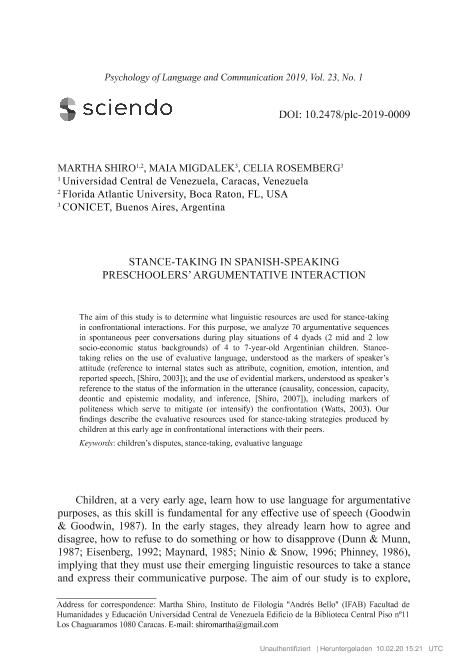Artículo
Stance-taking in Spanish-speaking Preschoolers' Argumentative Interaction
Fecha de publicación:
01/2019
Editorial:
Sciendo
Revista:
Psychology of Language and Communication
ISSN:
1234-2238
Idioma:
Inglés
Tipo de recurso:
Artículo publicado
Clasificación temática:
Resumen
The aim of this study is to determine what linguistic resources are used for stance-taking in confrontational interactions. For this purpose, we analyze 70 argumentative sequences in spontaneous peer conversations during play situations of 4 dyads (2 mid and 2 low socio-economic status backgrounds) of 4 to 7-year-old Argentinian children. Stance-taking relies on the use of evaluative language, understood as the markers of speaker's attitude (reference to internal states such as attribute, cognition, emotion, intention, and reported speech, [Shiro, 2003]); and the use of evidential markers, understood as speaker's reference to the status of the information in the utterance (causality, concession, capacity, deontic and epistemic modality, and inference, [Shiro, 2007]), including markers of politeness which serve to mitigate (or intensify) the confrontation (Watts, 2003). Our findings describe the evaluative resources used for stance-taking strategies produced by children at this early age in confrontational interactions with their peers.
Palabras clave:
CHILDREN'S DISPUTES
,
EVALUATIVE LANGUAGE
,
STANCE-TAKING
Archivos asociados
Licencia
Identificadores
Colecciones
Articulos(CIIPME)
Articulos de CENTRO INTER. DE INV. EN PSICOLOGIA MATEMATICA Y EXP. "DR. HORACIO J.A RIMOLDI"
Articulos de CENTRO INTER. DE INV. EN PSICOLOGIA MATEMATICA Y EXP. "DR. HORACIO J.A RIMOLDI"
Citación
Shiro, Martha; Migdalek, Maia Julieta; Rosemberg, Celia Renata; Stance-taking in Spanish-speaking Preschoolers' Argumentative Interaction; Sciendo; Psychology of Language and Communication; 23; 1; 1-2019; 184-211
Compartir
Altmétricas




